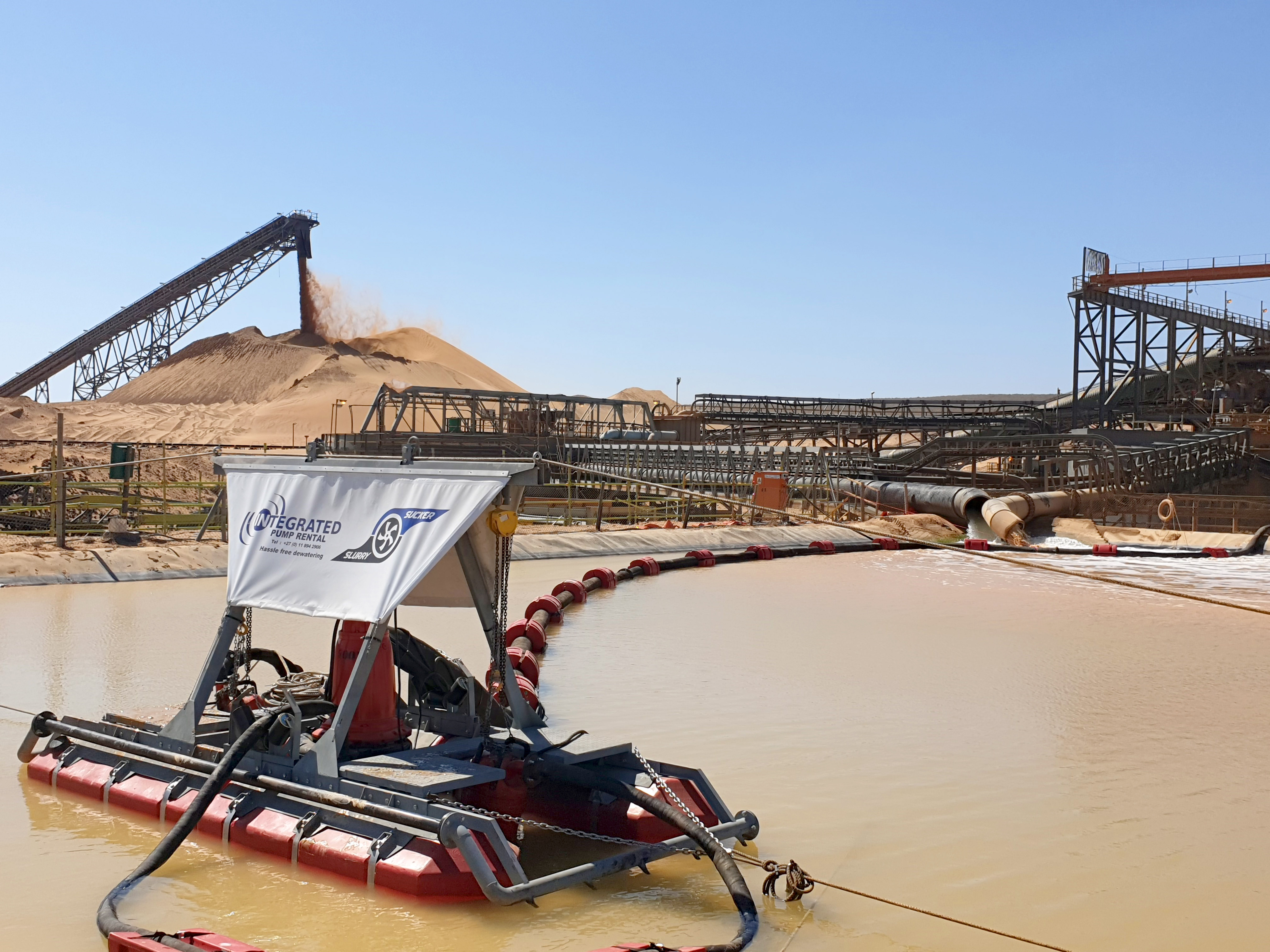Episode Transcript
[00:00:01] Speaker A: Capital is scarce, it can go anywhere you want to to attract it. You better have the right circumstances for it to be getting a return at the right amount of risk.
[00:00:12] Speaker B: How do you ensure that you tick the right boxes to secure bank funding for your project? What commodities are banks willing to fund? Hi, I'm Laura Cornish, editor in chief of Mining Review Africa. And welcome to deep in sites. This week, senior Editor Gerard Peter Chats to Hink Duh, business development director of mining at Rand Merchant Bank, about what is required to ensure banks will consider funding your project. Let's join the discussion.
[00:00:40] Speaker C: Hink Duop, thank you for joining us on Deep Insights today.
[00:00:44] Speaker A: Pleasure.
[00:00:45] Speaker C: Fast track to a post COVID-19 world. Will banks still have an appetite to fund mining projects in Africa?
[00:00:54] Speaker A: Thanks, Jared. I think absolutely.
Also, the funding interest has not disappeared because of COVID Mining is a long term business. The world will recover after this. There is certainly pressures on the banking industry at the moment because we're being asked to help a whole broad range of sectors across society with their liquidity issues as some industries have come to a halt. The good news, I guess, is that on a relative basis, the mining industry has actually not done so badly. Very few mines have stood for three months on end. A lot of them had short breaks, were allowed to run at 50%, back up at 100%. And although it's still unclear how operationally the impact will be from COVID where key personnel are down, sick are in quarantine at the moment, the outlook is that, first of all, commodity prices have held up well.
Currencies have been supportive in some of the producing countries, and China has restarted its industries fairly quickly. And there is a bit of a mismatch, obviously, where the Western world is currently, and particularly in the US and South America, under a lot of pressure from COVID china is already back in full swing and China is responsible for almost half the commodity demand in the world. So we've got actually quite a decent background for us to convince credit that mining is not necessarily the worst place to lend into great stuff.
[00:02:27] Speaker C: So, Hank, if I'm a mining company, how do I convince you as a commercial banker to consider my project?
[00:02:37] Speaker A: I guess we have a whole range of checks and balances and filters that we apply. First of all, probably important is country risk. There are certain countries that have made it quite difficult to actually look past all the other risks because of the environment and the legislative environment and the security of tenure that they apply. There's been a couple of countries that have gone backward on that in Africa, and if you have a fantastic project in the wrong jurisdiction, banks will simply not touch it. Secondly, and I mentioned it already, it's the quality of the project itself is quite key.
It is obviously important that you have a commodity that is fundable. What do banks consider fundable? It is often commodities that have either a hedgeable revenue line which takes some of the risk out of it. It has reasonably called stable pricing. Highly volatile commodities are not easy to finance for banks because it's just less predictable and higher risk. And I guess we also as a bank taker look at what order the commodities of the future. So copper has a very strong outlook because of the EV revolution and the green energy revolution behind it. And as a result, copper is normally one of the easier metals to fund. If you look at diamonds at the moment, it's probably a tougher industry to fund, not only because of what is happening under COVID, it also has an outlook which is probably not as clear to a lot of people because of what's happening in the world as what it is for copper. So the commodity has to be right, and the project you have in that commodity better be cost competitive. We in the boom periods have had looks at projects that were third or fourth quartile cost projects, which work fine in boom conditions, but get into trouble very quickly when the world comes back to normality. And those are the projects that are tougher to finance as well. You rather fund a first or second quartile producer that in case the world isn't as healthy as what it would be at the time you provide the funding, you still are in a safe environment and a safe company in the sense that it still has margin left when the prices come off. Then another reason, another issue, we look at single assets. One shot, projects are probably tougher to finance where there is a lightly financed company on aim, for example, having just one project, and it better work, otherwise there's nothing left. Those are quite tough to finance because when these projects get into trouble, we would still like as a bank normally the shareholders to step up and to put the missing funding or the gap in. And you often have found, and it's from experience that in those cases the shareholders normally run for the hills. So a strong sponsor or a strong shareholder or a strong shareholder company will obviously help as well for us to get this past credit. And I think finally, a strong management team that has executed projects before, has experience in bringing something from greenfield into production successfully on time, within budget is a major, major help in convincing people to trust the bank's money to a team like that.
[00:06:06] Speaker C: Henk let's look at mining responsibly. How important is ESG to the banks when it comes to funding new and current projects?
[00:06:19] Speaker A: Thanks. That is a good question, and it's definitely something that is starting to become more and more important.
First of all, if we talk project funding, most of the banks have now subscribed to the Ecuador principles, which is a set of conditions and regulations that determine the social environmental risks that are acceptable for funding institutions to accept and how a company manages those social environmental risks. It's quite a tight framework and it really requires companies to act in the best interest of the country, the communities around them and the environment. And without those regulations, controls, checks and balances reports being in place, you simply will not get the money. I guess another angle to ESG is also coming through. Now in the climate context, we are seeing similarly to other funders of mining projects, be it institutional funders or commercial banks. A lot of pressure developing in the coal industry, in particular the thermal coal industry at the moment, but that might move along further in the chain. For example, metallurgical coal eventually could become a problem as well. But those pressures are emerging and we're not blind to them. There's already some very harsh decisions being made around coal financing in other parts of the world. I think we have to in South Africa find a balance because we're so coal dependent from a power perspective, we have to have a reasonable time to actually transition to a different power mix. So at the moment, most South African banks are certainly still open to coal financing, but we are noticing the pressure globally and that is coming eventually to South Africa as well. So we have to be realistic around that. I guess most banks already have had quite tight requirements from the bankable feasibility stage. We need environmental studies to be done, environmental baseline studies. We have specialists signing off on that. We have departments looking after that as well. So even if funding eventually gets approved, the tracking of the behavior of that company is also built in our systems and report backs on that. So it's an absolute crucial part of financing. And we often then tell juniors as well to be in contact early with the banks so we can let them know what are the requirements for you to eventually get bank approval from an environmental studies, social studies and requirements that we impose on financing requests that come through to the bank.
[00:09:07] Speaker D: We will continue our conversation after this short message in August.
[00:09:13] Speaker B: Mining Review africa honors all the women in mining that have contributed to building a bigger, more sustainable and more equal mining sector. Join us on Deep Insights as we acknowledge the true transformation and influence that women bring to mining, from the boardroom to the coalface. This is also your chance to show your commitment to gender equality in your company and mining as a whole by sponsoring our special Woman of Impact podcast series in August. Want to know more? Click on the Engage tab on Minereview.com and join us in celebrating women's achievements in mining. Contact us today.
[00:09:53] Speaker D: Welcome back to Deep Insights. Let's continue our discussion with Hank Duwerp, business development director of mining at Rand Merchant bank.
[00:10:03] Speaker C: Finally, Hank, let's look at South Africa and the downward turn in its mining sector. What needs to happen to attract investment in this country?
[00:10:16] Speaker A: Thanks. There's probably a range of issues that have gotten us to this stage, and that's important to analyze. 1st, first of all, the way we approached the mining industry, say, from the early 2000s onwards, was more like, you're the enemy, we need to change you, and we're going to do it this way. There wasn't a necessarily consensus view on how that would need to happen. And one of the key things that probably was and is causing a shortness of projects was the prospecting. Licensing requirements that were imposed in the industry made it very unattractive for a lot of companies to even bother continuing to prospect.
The licenses were handed out to companies that often didn't have the capital nor the risk appetite or the funding backing from outside institutions to actually do what they needed to do, which is explore, develop, and eventually get a project going. I think that pipeline of prospecting is one of the big weaknesses of the South African mining scene. We have simply lost that appetite. Secondly, I think the depth of some of the ore bodies that we eventually were mining requires the whole system to gel together in a sense that capital needs to have the confidence to continue spending on deep level mines, because the commitments you make on deep level minds for capital are normally very long dated. If you lose faith of getting your money back or getting a return on the money, you commit now, and that return is only out there 1015 years from now, while your regulations regularly change and you don't know what those regulations will be, you simply stop spending. And I think that has happened to a certain extent in the industry as well. Big deep levels shafts are probably not going to be sunk in South Africa until we have a longer dated security. Again, on tenure, on the rules and regulations, on taxation, on royalties, on carbon taxes, and what have you.
[00:12:19] Speaker D: Is government doing enough to attract investment in South Africa?
[00:12:24] Speaker A: Investors simply need certainty. I think another issue that has not really helped in getting the industry going is if we have a mining charter that first of all, is not exactly investor friendly, but once there is certainty, people probably can live with a mining charter. But the certainty is missing every five years, changing the rules completely, and by the time you've finalized an agreement, you start negotiating on the next one already, because it's such a tedious process. And every time changing those rules further and making it even more tougher to actually start a mine in this country will make it absolutely impossible to get confidence back in the industry. So we need to find a way of giving people an investor certainty around a charter that doesn't change every five years, because the political flavor of the month has changed again. I think also what hasn't helped is that we've had a series of mines ministers that have been frankly anti industry. They were very tough to get hold of, there was never any trust built. And luckily with Gwyne Montasha having come in as new mines minister, it's been a world of difference on how the industry talks to the regulators and the people at the different departments that are managed by the minister. And there's a far more open and frank discussion rather than a fractious enemy like discussion that has been in place over the years. So that's very helpful and that couldn't help but change around. I think. Another big point that has squeezed the attractiveness of South African industry over the years is your regulatory input cost. You cannot have that type of increase in electricity prices and unreliable electricity because mines need reliable power supply. Apart from the cost, it has done major, major damage and I don't think it's realized enough how much damage that has done to the mining industry. We've lost a big portion of our smelting industry forever. I don't think that is coming back because you need competitive power for that and particularly reliable power for that. And as a result, for example, in the chrome industry, china is smelting our chrome and we're shutting down our chrome smelters and that is difficult to see how that will come back. The other important regulatory cost is transport.
We have transnet who controls the railway lines, we have transnet that controls the ports. And in other countries those sometimes have been run on a private basis. And some of the cost we achieve on the transport channels is not simply competitive compared to some of the other regions in the world that do bulk transport. There's also efficiency issues that have hampered the industry over the years that is getting a lot better and transit has certainly made a lot of moves, but those are big import and circumstantial conditions that you require to have a mining industry succeed.
Let me stop after that. Another point that is a big issue for mining companies to decide on is community relations and community risk. The last few years I've seen some extreme events where mines were basically shut down, trucks burned. And it's not because the mines are causing the problems. It's often the municipal services servicing those communities have failed and as a result, the mines get blamed or the mines get stopped in order to put pressure on the municipalities to sort out the problems. And it is one of the big issues around Richards Bay, for example, where Rio Tinto's assets are, the extension of that mine hung by a thread because the community issues there have been extreme and we need to provide the controls and the certainty that a mine doesn't provide a full on country system around itself. It mine needs the mine, it's got a job, it is socially responsible. It does provide often services in the form of hospitals, but we can't have the municipalities around them collapsing and then expect the mine to pick up the pieces and deal with it. We need to get that right because it makes mining so much more difficult to finance. And also to run, a mine needs to run 360 days a year, preferably. And in one of the examples I've had in the past presenting to Chinese companies trying to convince them to invest in South Africa, the answer that I got was, look, if I buy in Australia, my mind will run 360 days a year in South Africa. It's either the communities or the workers that strike. And maybe I run for 200 days or 250 days, but I don't know my returns by the time I have to commit capital. So it is something that if we want to sell South Africa, there's a couple of things we need to get right, and there's still a bit of fixing to go, and it's not an overnight exercise. It needs to be the industry and regulators coming together to come up with the plan. How do we sell South Africa? Because capital is scarce, it can go anywhere you want to to attract it. You better have the right circumstances for it to be getting a return at the right amount of risk.
[00:17:45] Speaker C: Great stuff. Hink. You certainly left us with a lot of food for thought regarding the South African mining industry. Henk Duwerp, business development director of mining at Rand Merchant Bank. Thank you very much for joining us on Deep Insights today.
[00:18:01] Speaker A: Pleasure.
[00:18:04] Speaker B: Thank you for listening. Please remember to subscribe to our weekly podcast, which is available on all popular podcast platforms. Give us a five star rating and share Deep Insights with your social network. Also, log on to MININGREVIEW.COM to access our webinars videos, industry insights and the latest mining news. Until next week, goodbye and stay safe.


